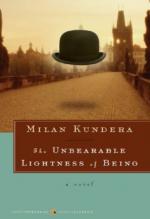|
This section contains 4,636 words (approx. 16 pages at 300 words per page) |

|
SOURCE: “Reading Oedipus in Milan Kundera's The Unbearable Lightness of Being,” in Comparative Literature Studies, Vol. 34, No. 1, 1997, pp. 71-83.
In the following essay, Pichova and Rhine examine the metaphorical and political significance of the Oedipus myth in The Unbearable Lightness of Being. According to the critics, Kundera invokes Sophocles's Oedipus Rex as an intertextual device to underscore aspects of guilt, misunderstanding, and entrapment.
Early in Milan Kundera's novel The Unbearable Lightness of Being, the narrator states that Tomas feels as if Tereza had appeared in his life like a forlorn child cast into a basket. Although the narrator first links the motif of the “found child” to the biblical Moses, the metaphorical tie to Oedipus will prove the most significant:
Again it occurred to him that Tereza was a child put in a pitch-daubed bulrush basket and sent downstream. He couldn't very well let a basket with a...
|
This section contains 4,636 words (approx. 16 pages at 300 words per page) |

|


